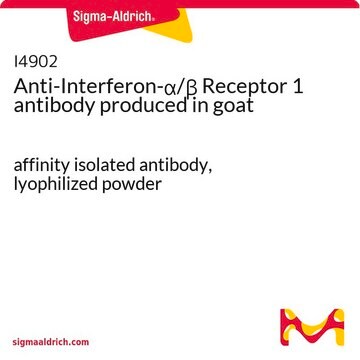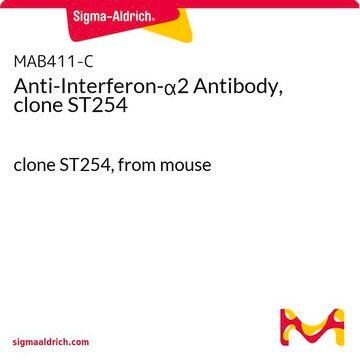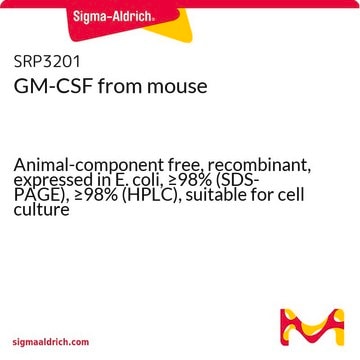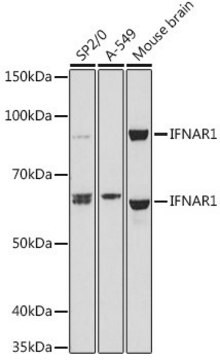04-151
Anti-IFNAR-1 Antibody, clone MARI-5A3
clone MARI-5A3, from mouse
Synonym(s):
interferon (alpha, beta and omega) receptor 1, beta-type antiviral protein, alpha-type antiviral protein, Type I interferon receptor 1, Cytokine receptor family 2 member 1, interferon-beta receptor 1, Cytokine receptor class-II member 1, IFN-alpha-REC, i
About This Item
Recommended Products
biological source
mouse
Quality Level
antibody form
purified antibody
antibody product type
primary antibodies
clone
MARI-5A3, monoclonal
species reactivity
mouse
technique(s)
flow cytometry: suitable
immunoprecipitation (IP): suitable
neutralization: suitable
western blot: suitable
isotype
IgG1κ
NCBI accession no.
UniProt accession no.
shipped in
wet ice
target post-translational modification
unmodified
Gene Information
mouse ... Ifnar1(15975)
General description
Specificity
Immunogen
Application
Immunoprecipitation Analysis: A previous lot was used by an independent laboratory in IP. (Sheehan, K., et al. (2006). Journal of Interferon & Cytokine Research. 26:804-819.)
Flow Cytometry Analysis: A previous lot was used by an independent laboratory in FC. (Sheehan, K., et al. (2006). Journal of Interferon & Cytokine Research. 26:804-819.)
Neutralizing Assay: A previous lot was used by an independent laboratory in neutralization studies. (Sheehan, K., et al. (2006). Journal of Interferon & Cytokine Research. 26:804-819.)
Quality
Flow Cytometry Analysis: 5 µg of this antibody detected IFNAR-1 in BALB/c splenocytes.
Target description
Physical form
Other Notes
Not finding the right product?
Try our Product Selector Tool.
Storage Class
12 - Non Combustible Liquids
wgk_germany
WGK 1
flash_point_f
Not applicable
flash_point_c
Not applicable
Certificates of Analysis (COA)
Search for Certificates of Analysis (COA) by entering the products Lot/Batch Number. Lot and Batch Numbers can be found on a product’s label following the words ‘Lot’ or ‘Batch’.
Already Own This Product?
Find documentation for the products that you have recently purchased in the Document Library.
Our team of scientists has experience in all areas of research including Life Science, Material Science, Chemical Synthesis, Chromatography, Analytical and many others.
Contact Technical Service








